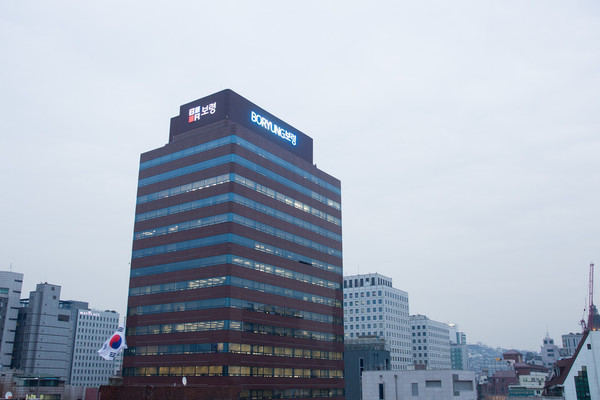Boryung Corp. said it recorded the largest quarterly earnings in the first quarter of 2022 in its history, continuing a solid growth after 2021.
The company’s sales and operating profit posted 170.6 billion won ($134.4 million), and 18.7 billion won in the first quarter, up 26 percent and 36 percent year-on-year, respectively. The first-quarter growth rates in sales and operating income were the highest since the company’s foundation.

In 2021, Boryung recorded 594.4 billion in revenue and 50.1 billion in operating profit, growing 10 percent and 25 percent, respectively. The annual earnings were the largest in the company’s history.
Boryung attributed the robust growth to CEO Jang Du-hyeon’s innovative management that focused on reinforcing the business competitiveness.
After taking office in September last year, Jang pushed for higher growth and profitability.
Jang reorganized the portfolio of the company’s products to center on in-house products and enhanced investment in sales and marketing. As a result, he led the company to grow in all business areas and post the largest first-quarter earnings this year.
Boyung’s sales posted 145.3 billion won in prescription drugs, 9.1 billion won in over-the-counter (OTC) drugs, and 13.8 billion won in consignment production in the first quarter. In each area, the on-year growth rates were 28 percent, 29 percent, and 63 percent, respectively.
Prescription medicines accounted for 84 percent of the first-quarter sales. Providing stability and continued growth, prescription drugs have positioned as a solid growth area for the company, Boryung said.
Along with more resuming economic activities under eased social distancing, the company restored respiratory and antibiotic products sales, which contributed significantly to the overall earnings in the first quarter, observers said.
Boryung’s new hypertension drug Kanarb (fimasartan) showed a good performance among prescription drugs. Kanarb monotherapy and combo drugs posted 32.5 billion won sales in the first quarter, expanding 19 percent from the same period of last year.
The sales of L50, a dyslipidemia drug that combines atorvastatin with ezetimibe, jumped 339 percent. Boryung released L50 in April last year.
Boryung posted 29.4 billion won sales from anticancer drugs in the first quarter. The company introduced Kyowa Kirin’s neutropenia drugs Grasin (filgrastim) and Neulasta (pegfilgrastim). The two drugs sold 3.5 billion won and 8 billion won, respectively.
Grasin is the first-generation neutropenia treatment, and Neulasta is the second-generation one. They rank top in prescriptions not only in Korea but worldwide.
Last year, Boryung also introduced Samsung Bioepis’ anti-cancer biosimilars Onbevzi (bevacizumab) and Samfenet (trastuzumab) to diversify the company’s oncologic drug portfolio.
In the first quarter of this year, the two biosimilars sold 1.6 billion won and 1.1 billion won in the local market.
Boryung’s central nervous system treatments also performed better. Lilly's schizophrenia treatment Zyprexa (olanzapine), which Boryung acquired for local sales and licensing last year through legacy brands acquisition (LBA), pushed up the overall CNS sales by 119 percent to 6 billion won in the first quarter.
The BLA strategy refers to acquiring an original drug to maintain a considerable sales volume and market share based on high brand loyalty even after the patent expires.
Earlier in 2020, Boryung introduced Lilly’s anticancer drug Gemzar (gemcitabine) using the LBA strategy. Zyprexa is the second LBA item following Gemzar.
On the back of resumed economic activities amid a slower spread of the Covid-19 virus, Boryung’s sales of respiratory and antibiotics also grew rapidly. For example, first-quarter sales of the antibiotic Meiact (cefditoren pivoxil) increased 94 percent from the previous year, and those of penicillin and cephalosporin also climbed 65 percent to 13.8 billion won.
Among the OTC drugs, Younggaksan Powder and Yonggaksan Cool Powder for cough and sore throat recorded solid sales growth. Sales of Yonggaksan brands posted 3.9 billion won, up 35 percent year-on-year in the first quarter, amid the spread of the Omicron variant and Covid-19 home treatments.

